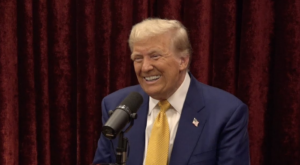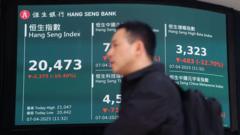Trump's recent tariff ultimatum against China has left both the U.S. and international markets on edge, as countries scramble to respond.
Trump's Tariff Ultimatum: A New Economic Tension with China

Trump's Tariff Ultimatum: A New Economic Tension with China
As President Trump threatens additional tariffs on Chinese goods, global markets and diplomatic relations are at a crossroads.
In a bold move that could redefine U.S.-China trade dynamics, President Trump has demanded that China retract its retaliatory tariffs or face punitive tariffs of 50 percent effective immediately. This assertion adds to a staggering 104 percent total in tariffs imposed since his administration began.
Countries across Asia reacted swiftly, with Bangladesh and Vietnam urging Trump to reconsider, while the Philippines offered to lower tariffs on U.S. imports. South Korea and Japan also expressed a desire for direct negotiations with the U.S. to mitigate the looming economic impact.
Meanwhile, officials in Europe have adopted a two-pronged strategy by proposing significant cuts to tariffs on American automobiles and industrial goods. However, these gestures were deemed insufficient by Trump, who remains resolute about enforcing his tariff policies. E.U. representatives are expected to vote soon on which U.S. products they might target with counter-tariffs, adding layers of complexity to the international trade framework.
As Wall Street reacted to the escalating tensions, the S&P 500 experienced notable volatility, reflecting investor uncertainties regarding global trade stability.
This tariff escalation coincides with other developments within the Trump administration, including ongoing controversial immigration policies, which include plans to expand detention facilities significantly. As the administration pushes through its agenda, the ramifications of these trade policies could shape not only economic but also geopolitical landscapes moving forward.





















